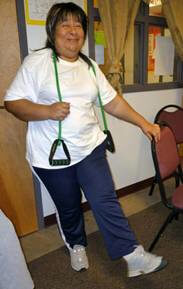Contact: Cliff Despres, (210) 562-6517
$3.48M from NIH supports five-year program in Lower Rio Grande Valley
SAN ANTONIO (Aug. 30, 2012) — Latinas are less physically active than Latino men and are less likely to meet physical activity guidelines than other population groups. This inactivity may lead to obesity and associated conditions like diabetes and heart disease.
To improve Latinas’ health, a new five-year, $3.48 million study will use promotoras – trained community health workers – to lead culturally appropriate group education and exercise sessions for Latinas in community centers in South Texas’ Lower Rio Grande Valley, says study leader Deborah Parra-Medina, Ph.D., M.P.H., professor at the Institute for Health Promotion Research (IHPR) in the School of Medicine of The University of Texas Health Science Center at San Antonio.
Participants also will get newsletters and telephone counseling.
The effort, called Enlace (which means to “connect” or “join” in English) and funded by the National Institutes of Health, aims to increase Latinas’ physical activity rates.
“The idea behind Enlace is that, through this promotora intervention, Latinas will gain an otherwise-unavailable layer of social support to overcome barriers to activity and make positive behavioral changes – namely that Latinas engage in 30 minutes of moderate-to-vigorous physical activity on five or more days a week,” Dr. Parra-Medina said.
Dr. Parra-Medina and her colleagues have worked with community groups to identify and understand factors that influence physical activity behaviors among Latinas in South Texas.
They identified several barriers: the dominance of work and family responsibilities, time, social isolation, lack of social support and personal motivation, access issues (e.g., program costs, lack of childcare and transportation), neighborhood safety and other factors.
The team then developed an Enlace intervention using promotora to work with Latinas to remove those very barriers and enable increased physical activity.
They tested Enlace on a small scale last year in South Texas and also in South Carolina.
In that test, the women in the Enlace intervention actually increased their physical activity by 56.4 percent, compared to 48.8 percent among control-group women.
For the new Enlace study, Dr. Parra-Medina’s team will recruit 704 Latinas ages 18-64 who do not meet federal physical activity guidelines from eight community resource centers in colonias – impoverished, underserved Latino settlements in the Lower Rio Grande Valley.

Half the women will be randomly assigned to the Enlace intervention, which includes:
- 16 once-a-week promotora-led group exercise sessions; and
- 24 weeks of a maintenance intervention with monthly promotora-delivered newsletters and telephone counseling.
The other half will serve as a control group. They will receive:
- 16 once-a-week promotora-led group sessions on home safety, first aid and emergency preparedness; and
- monthly home visits and generic health education materials during the maintenance intervention period.
Dr. Parra-Medina’s team will compare the two groups based on minutes per week of moderate-to-vigorous physical activity, physical fitness, weight maintenance and related factors, such as environmental barriers, social support and self-efficacy.
“We hypothesize that Latinas in the intervention group will significantly increase their levels of moderate-to-vigorous physical activity, compared to those in the control group,” Dr. Parra-Medina said.
Study co-investigators include: Daniel Carlos Hughes, Ph.D., assistant professor at the IHPR; Joel Michalek, Ph.D., professor and vice chairman of epidemiology and biostatistics at the UT Health Science Center San Antonio; Daisy Morales-Campos, Ph.D., post-doctoral fellow at the IHPR; and Jennifer Salinas, Ph.D., assistant professor of epidemiology and biostatistics in The University of Texas School of Public Health’s Brownsville Regional Campus.
This study also is collaborating with the Texas A&M University Colonias Program, including Laura Treviño, regional director of the program in the Lower Rio Grande Valley.
The grant number is 1 R01 HL111718-01A1 from the National Heart, Lung, and Blood Institute.
The University of Texas Health Science Center at San Antonio, one of the country’s leading health sciences universities, ranks in the top 3 percent of all institutions worldwide receiving federal funding. Research and other sponsored program activity totaled $231 million in fiscal year 2011. The university’s schools of medicine, nursing, dentistry, health professions and graduate biomedical sciences have produced approximately 28,000 graduates. The $736 million operating budget supports eight campuses in San Antonio, Laredo, Harlingen and Edinburg. For more information on the many ways “We make lives better®,” visit www.uthscsa.edu.
The Institute for Health Promotion Research (IHPR) at The University of Texas Health Science Center at San Antonio investigates the causes and solutions to the unequal impact of cancer and chronic disease among certain populations, including Latinos, in San Antonio, South Texas and the nation. The IHPR, founded in 2006, uses evidence-guided research, training and community outreach to improve the health of those at a disadvantage due to race/ethnicity or social determinants, such as education or income. Visit the IHPR online or follow its blog.

